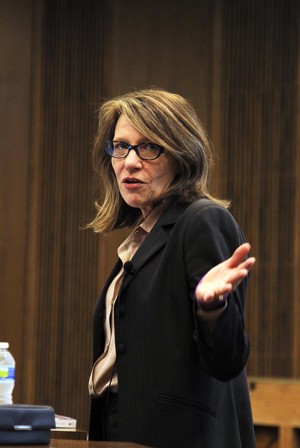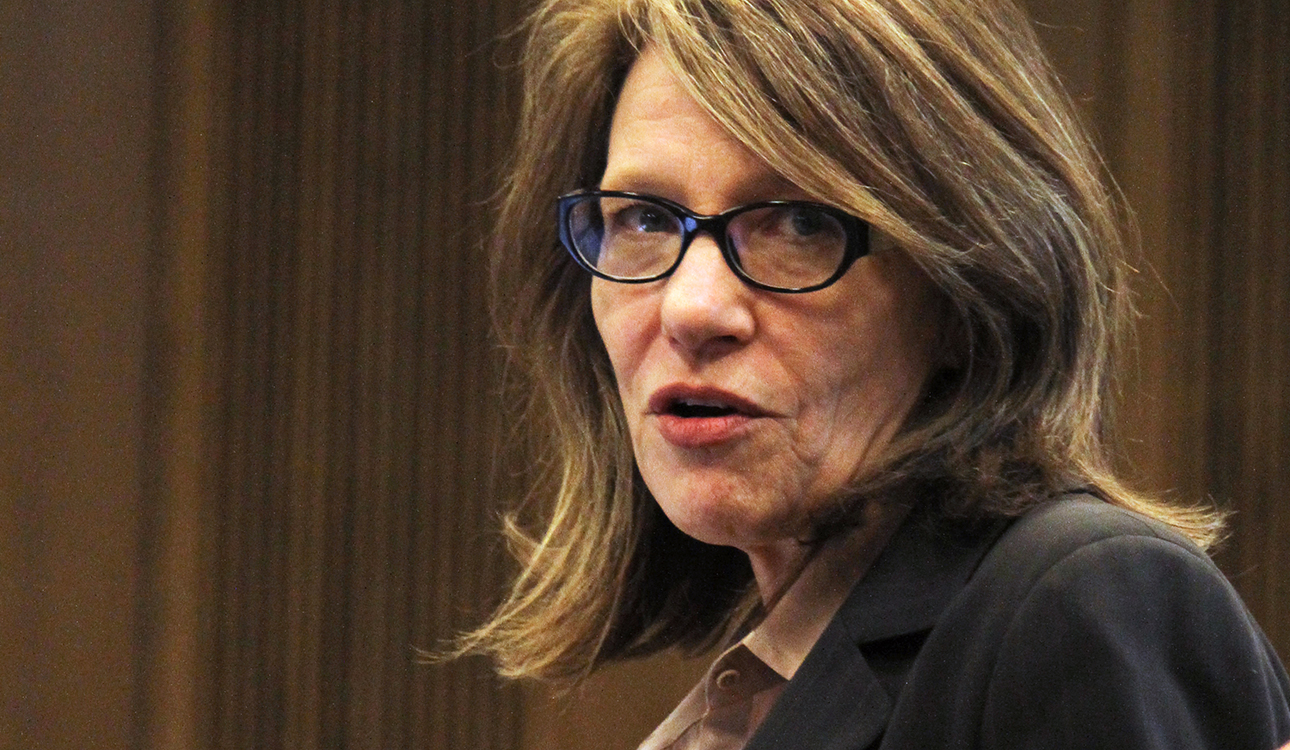
Travis Taylor | Lariat Photo Editor
Reporter
“The sweaty bodies pressed against one another as they spoke in tongues and danced in euphoria while they waited for the world to end. But one little girl in the back of the tabernacle just watched through the sawdust air.”
Donna Johnson, author of “Holy Ghost Girl: A Memoir,” will discuss her journey to self-discovery on the “Sawdust Trail” during the American Studies Association of Texas Conference at 7:30 p.m. Friday in Kayser Auditorium of the Hankamer School of Business.
The “Sawdust Trail” refers to the evangelical tent revival movement in the South.
In her memoir, Johnson recalls what it was like to grow up in the early 1960s with Brother David Terrell, one of the last tent evangelists in the South. Tent evangelism refers to a traveling group of evangelical Christians who spread God’s Word through tent revival services across the country.
The book also chronicles Terrell’s rise and eventual fall: womanizing, his evolution into a leader of an apocalyptic sect and his abuse of money in later years.
In 2011, Johnson published her book, after the death of a family member brought back all the memories of the past she had chosen to forget. Johnson said the book allowed her a way of connecting who she used to be and who she had become.
Johnson said she tried for 25 years not to think about all of it. An uncomfortable conflict had been created inside her. Despite this experience she described as “cognitive dissonance,” Johnson was finally able to look back at her history with acceptance and find her story.
Johnson said she was 3 years old when her mother became an organist for Terrell. As a child, Johnson said miracles were as common as a cup of coffee.
“We were conditioned to think that if you pray for someone, they were absolutely healed,” Johnson said.
In the tent, she said she was taught to believe the world was constantly coming to an end, and people were out to get her. In a sense, this was correct. A number of groups had a problem with what Terrell was doing. Some, such as the Ku Klux Klan, showed up at the tent services on numerous occasions.
“As a child it was sometimes terrorizing because you knew someone was after you, but you didn’t really know who it was,” Johnson said. “I remember asking my mom, ‘Who are they?’”
Finally, she learned who they were. The Klan beat up Terrell on occasion. Johnson said they often tried to force them to shut down. At a tent revival service in Bossier City, Lou., the 4 year old saw the men dressed in white for the first time.
“They showed up in sheets,” Johnson said. “I thought, of course, that it was the end of time and that these were the angels, right? I remember watching those guys in the sheets, and I looked down, and I noticed they had on black wingtip sort of shoes. That’s how I knew they were men. That’s how I knew that they were not some supernatural force, and I began to get it.”
Despite the obstacles, Terrell’s ministry continued to travel and grow. The time Johnson spent traveling with the tent was a time filled with wondrous works, but it was also a time occupied with relentless fear.
“I grew up thinking the world was always coming to an end as a little girl,” Johnson said. “In my earliest years, I traveled with the tent consistently. I didn’t start school until I was 7.”
Her mother, who was having an ongoing affair with Terrell, continued to travel with the tent to play the organ and take on the task of educating the Terrell children.
At age 7, Johnson said she and her brother were shipped off to live with different people her mom knew to start school. However, Johnson said they still attended the revival services, which contributed to her identity issues.
“After the age of 8, I became one way at school and at home,” Johnson said. “And then I would go there. I would take off my jeans and put on some really long dress, and then I would be some other way.”
Because she was a quiet child, Johnson said she read a lot. In the tent they weren’t allowed to read. She said Terrell taught his followers that everything was a sin except going to church. So when she stopped traveling with the tent, she began to read anything she could about the world outside of the tent.
The world was a different place outside of the tent. In the tent, Johnson had been taught that the world outside was bad, but the more she knew about the world, the less she believed that. Johnson never felt completely confident in the tent. While everyone else seemed moved in a dramatic way, she was the one in the back observing the show.
“I felt really moved by the revivals, but I never spoke in tongues,” Johnson said. “I never started dancing around. I was always the one just watching.”
Johnson said she couldn’t deny that she saw powerful things happen in that tent, but she also saw what went on behind the scenes. She said she watched Terrell’s movement transform from a southern tent revival to a cult.
At the time, Terrell urged followers to sell everything and move to the “Blessed Areas,” self-sustaining communities off the grid. Johnson was 15 years old. Her mother told her that they would be leaving their life in Groesbeck to wait out the apocalypse in one of these areas. The time spent in Groesbeck was the first time she had a normal life, friends and a stable home. Johnson said the thought of going back was unbearable.
“I couldn’t think of anything more horrible than waiting on the end of the world,” Johnson said. “I mean, all I wanted was for the world to start. He was talking about the world ending.”
She left the revival, got married and went out into the world to start her life, instead of waiting for it to end. Johnson said although she had seen and felt very powerful things, there was a huge schism between the teachings and the actions of Terrell.
“I thought that to believe in God meant I had to believe in Terrell,” Johnson said.
This created a sickly divide between reality and faith in Johnson’s mind. She said she thought she had lost her faith in God and in Terrell.
“I was shocked when my mom told me something that he did,” Johnson said. “I was shocked because I could actually feel another level of faith in him that I didn’t know I had just sort of falling out of me.”
It took Johnson a long time to find out who she truly was, and what she believed.
“You know, sometimes you don’t know what you think and what you believe until you know what you don’t,” Johnson said.
During the years after she left the movement, Johnson had to transition into the mainstream lifestyle of the world outside of the tent. Johnson said the transition was extensive and difficult. Johnson had a daughter when she was 18 years old and divorced shortly after. She then attended McLennan Community College where she learned how to behave normally by observing the other students.
“I didn’t really know how to act,” Johnson said. “I didn’t really know how to dress. I just watched people a lot. I would just watch them and just sort of soak up who they were and how they were and try to emulate it.”
Johnson said she could not have moved forward without all the people who mentored her in one capacity or another. For example, John Nobis, part-time employee at McLennan Community College, helped her work through some of the especially rough times.
“I was Donna’s counselor at McLennan Community College at the time,” Nobis said. “She and my wife Joyce were good friends.”
Johnson left her family at 16, became a mother at 18, went to college, got divorced and moved to Austin. After her long journey down the “Sawdust Trail,” Johnson said she was able to move beyond her history to finally find her true identity. Only then was she able to see how her history was intertwined with her identity.
“It really enabled me to integrate my history with the person I had become,” Johnson said. “There was who I had been and who I had become, and those seemed like very different people to me. I didn’t have a way to bridge those two people. The writing of the book allowed me to do that.”
She said she was able to finally stop running from her past and embrace it.
“I began to see the strange beauty of the tradition that I came from,” Johnson said. “I began to be able to embrace the positive aspects of that tradition and finally to accept it. In a way, I had never been able to accept my own story. I think in some ways that’s the story of all of us.”






